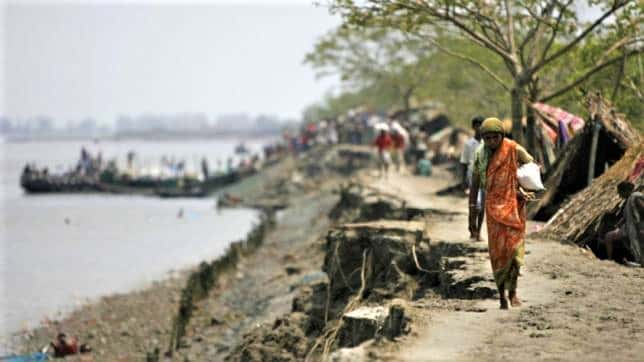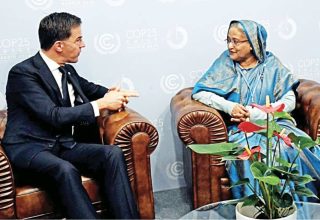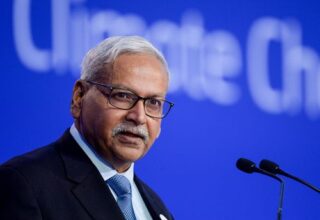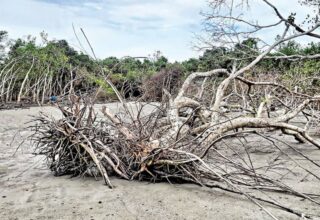
The Green Climate Fund (GCF) was created under the United Nations Framework Convention on Climate Change (UNFCCC) to channel USD 100 billion a year starting from 2020 onwards, which the developed countries have pledged to provide to developing countries to tackle climate change through both mitigation as well as adaptation activities. The Secretariat of the GCF is located in Korea and the GCF Board has equal representation from developed and developing countries.
One of the first and most laudable decisions that the board took early on was to decide that they would allocate half their funds for adaptation projects and half for mitigation, and also prioritise the adaptation funds for the most vulnerable developing countries. However, they are still struggling to meet these targets.
As the GCF was a new institution, it had to start from scratch in getting human resources in place as well as setting up procedures for accessing the funds. One procedure they set up was to require all developing countries to name a National Designated Authority (NDA) as the GCF focal point on behalf of a government followed by identifying National Implementing Entities (NIEs), who would need to be accredited to enable them to apply for funds.
The government of Bangladesh named the Economic Resources Division (ERD) of the Ministry of Finance as the NDA for Bangladesh and recently two NIEs have finally been accredited after over two years of trying. The first is the Infrastructure Development Company Limited (IDCOL), which is involved mainly in mitigation activities such as solar energy projects, and the second is the Palli Karma Sahayak Foundation (PKSF), which supports mainly adaptation projects. Both NIEs are now in the process of applying for funds but have yet to receive any.
This situation of inordinate time spent in getting accreditation is also the case for many other developing countries, and so earlier this month, the government of Bangladesh, through ERD, decided to host a three-day workshop for South-South knowledge sharing with the NDAs and NIEs from the South Asian countries. Thus the gathering had NDAs and NIEs from Afghanistan, Bhutan, India, Nepal, Pakistan and Sri Lanka who shared their experiences of getting accreditation and getting projects together. The GCF was also invited to send two representatives to participate and listen to the experiences of the national entities. To the credit of the GCF, they did attend the event and took careful note of what they heard.
I will summarise below some of the key issues that were discussed.
The first and foremost issue for every country was the many difficulties they faced in getting their respective NIEs accredited by the GCF (several South Asian countries have not yet been able to accredit an NIE). The main difficulty seemed to be the requirement for submitting enormous amounts of documentation to prove their fiduciary standards. While it is quite correct for the GCF to demand that stringent fiduciary standards are met, they nevertheless need to understand the need to help entities with fulfilling the requirements. A so-called level playing field that has the same requirements for every entity is in fact biased against the ones with least capacity, who may be the most deserving.
To be fair, the GCF is quite aware of this issue and has started to provide capacity building support to NDAs and NIEs, which is a welcome development.
The second issue that still causes confusion for those wishing to submit proposals to the GCF for funding both mitigation and adaptation projects, is the need to show a paradigm shift or transformational change as a result of the proposed project. The GCF also do not provide much guidance as to what they mean by this requirement as they want each country to define it for themselves. While such country-driven choice is good in principle, without any guidance, it’s just confusing. As the GCF develops a significant pipeline of approved projects, it can be assumed that others will be able to learn from those approved project proposals. This is also where South-South knowledge exchange is important.
The third issue causing confusion relates to adaptation projects where the requirement to differentiate adaptation to climate change from development has already caused two proposals—one from Bangladesh and the other from Ethiopia—to be rejected by the Board of the GCF because they felt the projects were primarily development projects and not addressing climate change.
Again, while it is correct for the GCF Board to insist that it is a fund for climate change, not for development, there needs to be some allowance for development co-benefits to be allowed. Fortunately, both those projects were revised, resubmitted and approved, but the confusion about how to distinguish adaptation from development still remains. The GCF is aware of this and is planning to provide better guidance going forward.
Fourthly, there was the unsolved issue of reaching adaptation funds to the most vulnerable countries and communities as relatively little of the adaptation funds are actually reaching the most vulnerable. Again, this will require some investment in finding and prioritising those countries and communities. The assumption that rules are fair because they apply to everyone equally can result in extremely unfair outcomes if the rules are too difficult for the poorest and most vulnerable to follow.
Finally, the issue of imbalance in GCF funding to mitigation instead of adaptation, despite its decision to have a fifty-fifty balance, is still a recurring problem that the Board and Secretariat of the GCF need to address if they wish to provide half their funding to adaptation projects.
In conclusion, the three-day workshop was felt by all participants to be a success in building a regional network of NDAs and NIEs who will continue to share experiences with each other. Even the representatives from the GCF acknowledged that it was a valuable learning experience for them and promised to share their lessons with the Secretariat. In the end, the bottom line is that everyone wants the GCF to succeed in disbursing many billions of dollars to developing countries for adaptation as well as mitigation, and even if there are inevitable teething troubles, the sooner they are identified and corrected, the better for both GCF as well as the NDAs and NIEs.
Originally this article was published on May 23, 2018 at Daily Star. The author Dr. Saleemul Huq is the director of the International Centre for Climate Change and Development (ICCCAD) at the Independent University, Bangladesh (IUB).
Email: saleemul.huq@icccad.net






